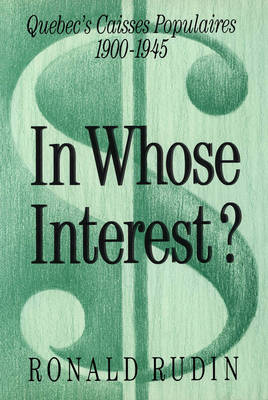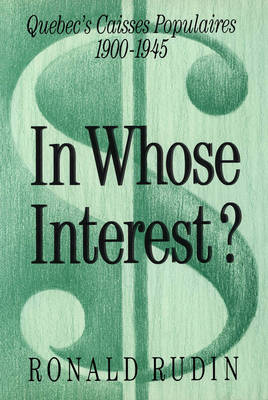
Bedankt voor het vertrouwen het afgelopen jaar! Om jou te bedanken bieden we GRATIS verzending (in België) aan op alles gedurende de hele maand januari.
- Afhalen na 1 uur in een winkel met voorraad
- In januari gratis thuislevering in België
- Ruim aanbod met 7 miljoen producten
Bedankt voor het vertrouwen het afgelopen jaar! Om jou te bedanken bieden we GRATIS verzending (in België) aan op alles gedurende de hele maand januari.
- Afhalen na 1 uur in een winkel met voorraad
- In januari gratis thuislevering in België
- Ruim aanbod met 7 miljoen producten
Zoeken
€ 177,45
+ 354 punten
Omschrijving
While the caisses, begun by Alphonse Desjardins in 1900, are usually seen as committed exclusively to noble ideas such as the betterment of the poor, Ronald Rudin takes a more realistic approach by examining the interests of those involved in its affairs. The petite bourgeoisie who founded the movement were sincere about helping the poor but, as Rudin reveals, they had their own concerns as well. They believed that the decentralized organization and local influence of the caisses would help them to re-establish the power they had wielded in an earlier age. Members of a rising middle class, however, wanted to centralize the movement and did not accept its founders' views on such matters as the role of the caisses as agents of Catholicism and nationalism. These ideological conflicts, which resulted in a major schism within the caisses populaires in 1945, foreshadowed the debates leading up to the Quiet Revolution. In Whose Interest? is not a narrowly focused institutional history. Rather, the history of the caisses is seen in the context of the evolving social structure of Quebec and clarifies our understanding of the social and economic history of the province over a period of nearly fifty years.
Specificaties
Betrokkenen
- Auteur(s):
- Uitgeverij:
Inhoud
- Aantal bladzijden:
- 208
- Taal:
- Engels
Eigenschappen
- Productcode (EAN):
- 9780773507593
- Verschijningsdatum:
- 1/08/1990
- Uitvoering:
- Hardcover
- Formaat:
- Genaaid
- Afmetingen:
- 152 mm x 229 mm
- Gewicht:
- 481 g

Alleen bij Standaard Boekhandel
+ 354 punten op je klantenkaart van Standaard Boekhandel
Beoordelingen
We publiceren alleen reviews die voldoen aan de voorwaarden voor reviews. Bekijk onze voorwaarden voor reviews.









